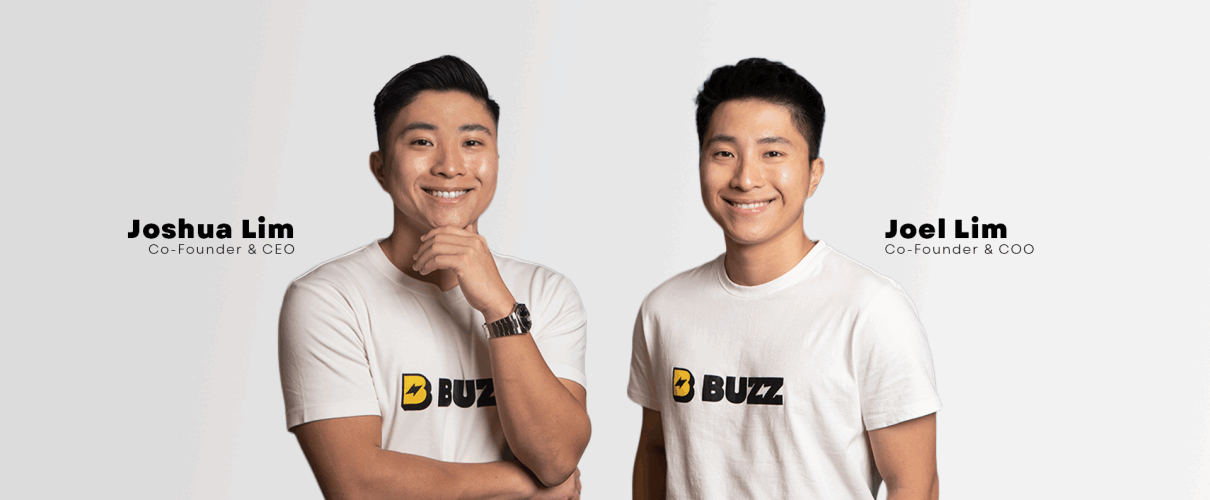The First Pivot: From Impact to Commercial Viability
Their journey began with an idea rooted in impact. Back then, the duo had launched a startup under the name Beebag, driven by a simple but ambitious goal: to reduce single-use plastic waste. They developed a mobile rewards app paired with smart reusables—think reusable bags and cups embedded with NFC chips. Each time a user reused these items at partner stores, they earned points. “It was a way to nudge behavioural change,” Joshua explained. “To get people to actually bring their bags instead of leaving them in their car.”
Despite the promise of the concept—it soon became clear that the idea could not scale in the way the twins had hoped. Their first realization came about a year and a half in, following early traction but slow business uptake. “We had to admit that businesses weren’t biting,” Joshua said. But things got real when they received backing from venture capital firms.
“We had to scale. And our original model couldn’t do that. So we pivoted.” That pivot led them to Buzz, a mobile app where users could upload their purchase receipts to earn cashback points. More than just a reward system, it was a tool designed to leverage consumer behaviour. From there, they could serve users with highly targeted, relevant offers.
“If someone buys milk every week, we can serve them milk offers,” Joshua explained. “It’s relevant, personal, and based on what they actually spend.”
Second Pivot: B2B and the Power of Integration
But just as they found their footing, the landscape changed again. The funding climate cooled—VCs were less eager to back high-burn models with uncertain returns. And so, once again, they pivoted.
“We took the same concept and shifted to a B2B model.” Rather than pushing their own consumer app, they began integrating their solution into third-party apps. Think any number of consumer-facing platforms. Their tech infrastructure sits in the background, allowing users of those apps to upload receipts and collect rewards—all without downloading anything new.
“We’re like a white-label solution,” he explained. “Users do nothing different, but they get something more.”
Creating a New Marketing Channel

At its core, BuzzRewards is now a data and insights company. It helps brands reach consumers with personalised offers by leveraging real consumer purchase data. But Joshua’s and Joel’s bigger vision is even more ambitious.
“We want to transform everyday consumer apps into a new marketing channel,” he said. Rather than brands pouring their budgets into Facebook, Google, or outdoor ads, BuzzRewards helps them reach users inside the apps they already use—while giving those users more value for their time and money.
Their unique angle? BuzzRewards focuses on daily essentials. “Most cashback platforms concentrate on F&B or lifestyle. But we work with grocers and FMCG brands—things people buy weekly. That’s our USP.”
The Mindset That Powers the Business

One of the most defining qualities of Joshua and Joel is their comfort with change. They don’t just pivot—they do so without panic, using each shift as a stepping stone. “The idea isn’t the most important thing,” Joshua reflected. “It’s the problem you’re solving. And the bigger the problem, the more potential for impact and business potential.”
This focus on solving real-world problems, rather than clinging to a fixed idea, allows them to move fast, unlearn, relearn, and keep momentum.
Their decision to start the business right after graduation wasn’t coincidental. “We had nothing to lose,” Joshua said. “No commitments, no big lifestyle costs. We told ourselves: give it our all now, while we can afford to fail,” he enthused.
They were aware that entrepreneurship wasn’t easy—but they also didn’t know exactly how hard it would be. “That naivety helped,” he laughed. “If we knew how tough it was, we might have hesitated.”
Built on Trust, Backed by Family
Joshua and Joel aren’t just co-founders. They’re twin brothers. That comes with its own unique dynamic.
“It’s not like talking to yourself,” Joshua said with a smile. “We have very different personalities. I’m more outward-facing—sales, vision, partnerships. Joel is inward—finance, tech, operations. We complement each other.”
Most importantly, they trust each other fully. “I never have to check if he’s doing his part. And he doesn’t check on me. We’ve been doing things together all our lives. That trust is a massive asset.”
While their father is a business owner himself and a second-generation leader, Joshua doesn’t credit any direct influence—though he does acknowledge that growing up in a family with business exposure may have planted the seed. “Maybe it just made the idea of starting something feel normal,” he said.
Challenges: From Talent to Traction
Their journey has not been without challenges. Building the first team was a hustle—friends, family, introductions, cold LinkedIn messages. Later, they had to reset the team to align with their growing ambitions.
“In a startup, the team defines the trajectory. So we had to make some hard decisions.”
Another key challenge was traction—both on the user side and the business partner side. “Zero to one is the hardest. No one wants to be the first partner. But once you get your foot in the door, others follow.”
Funding remains a constant concern. The so-called “funding winter” means VCs are pickier, slower, and more risk-averse. “We’re talking even to overseas VCs.”
Seeing the Road Ahead
Even with the ups and downs, Joshua remains sure about the future. Their partnerships—give them credibility and user base leverage. The task now is to deliver results and grow advertiser interest.
“We’re building both sides of the marketplace: publishers and advertisers. That’s the real work,” he said.
And if it doesn’t work? The mindset is not about failure—it’s about finding the next connecting point. “Even if this business doesn’t pan out, we’ll still be in the ecosystem. Maybe with a VC. Maybe with another startup. But always moving. Always learning.”
Advice for Peers
Joshua leaves us with one of the most profound takeaways from his journey.
“Most people overvalue the idea. But ideas are flexible. The real thing is to focus on the problem. Talk to users. Talk to clients. Ask: what problem are we solving? And keep evolving.”
That curiosity, combined with the courage to pivot and the humility to learn, is what makes Joshua and Joel’s story so compelling. It’s not about having all the answers. It’s about never stopping the search.
Buzz isn’t just a business. It’s a mindset in motion.
And Joshua and Joel Lim are proof that entrepreneurship isn’t just about starting up—it’s about staying sharp, staying humble, and always staying in motion.









